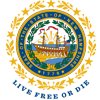Boating and Access
New Hampshire is a Boater's Paradise
You're never more than a short drive away from a boatable lake, pond or river in the Granite State. There are more than 400 public federal and state-owned launch sites where you can get your motorboat, kayak or canoe into the water, not to mention town-owned ramps that you can check out.
Safe Boating Tips:
- Don't Overload -- Observe passenger and weight limits.
- Wear Life Jackets or Vests -- State law requires one wearable life preserver for each person in a boat. All children age 12 or under must wear an approved vest or jacket.
- Know the Water -- Always carry a chart (map).
- In an Accident -- Personal safety comes first; report all injuries and damage.
- Water and Alcohol Don't Mix -- Boating while intoxicated is against the law.
- Use Your Lights -- All boats operating after sunset until sunrise must display visible lights.
- Hunting is Prohibited while under power from a motor, as is carrying a loaded firearm (unless you possess a NH pistol permit).
- Dumping and Littering are Illegal, and punishable as a misdemeanor (up to a year in jail and/or a $2,000 fine).
- Don't Harass Wildlife -- Killing or deliberately harassing water birds through the operation of a boat is "Taking" wildlife (fines of $1,000 or more, and loss of fishing license).
- Take a Boating Safety Course -- Contact the NH Marine Patrol Bureau at (888) 254-2125 or (603) 267-7256.
Aquatic invasive Species in New Hampshire
Some species of aquatic wildlife and plants have become unwanted invaders in New Hampshire's waters. Learn more about aquatic invasive species, the laws and rules around possession and use of aquatic species, and what boaters and anglers can do to help stop the invasion!
Statewide Public Boat Access Program
The Facilities and Lands Division manages the planning, design and construction of public works projects, such as boat ramps and access sites throughout the state. This division is also responsible for the coordination of land conservation projects, including purchase and sale, easements, land use agreements and/or special use permits.
The Statewide Public Boat Access Program is a multifaceted program representing the public’s diverse needs for water recreation opportunities. It was established by state statute in 1993 (RSA 233). The goal of the program is "the acquisition, construction, refurbishment, maintenance, and operation of new and existing public boat access areas."
How Boat Access Sites Are Developed:
The Fish and Game Department's Statewide Public Access Program uses a variety of sources to identify water bodies needing access, including data from a statewide needs assessment conducted by the University of New Hampshire; the Public Water Access Advisory Board; Office of Energy and Planning (formerly the Office of State Planning) guides; interested citizens; and Department staff.
Once a water body is identified, land suitable for an access facility is carefully sought and evaluated. Only then can the Fish and Game proceed with plans to own or control and develop a site. The Department develops access sites for public use with environmental quality in mind. Regional planning commissions, municipal agencies, river and lake associations, sporting clubs and shorefront property owners are a few of the groups that help guide the Department's access initiatives. State and federal permits must be secured to protect water quality, endangered species, wetlands, and other natural resources before a project can proceed.

Wildlife & Sportfish Restoration Program
Wildlife & Sportfish Restoration Program
NH Fish and Game’s Statewide Public Boat Access Program is funded through boat registration fees and federal Sport Fish Restoration funds. Fish and Game’s Facilities Construction and Lands Division acquires land for public water access sites, refurbishes existing sites, and builds new public boat access areas.

Public Water Access Advisory Board
PWAAB information and meeting updates



